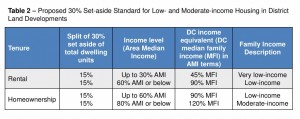Please accept these comments on behalf of the Coalition for Smarter Growth. We are a regional organization based in the District of Columbia focused on ensuring transportation and development decisions are made with genuine community involvement and accommodate growth while revitalizing communities, providing more housing and travel choices, and conserving our natural and historic areas.
DMPED should recommit to leveraging public land dispositions for affordable housing
We are greatly disappointed in DMPED’s reduced expectations for affordable housing in new public land dispositions. Given the increasing challenge of housing affordable to our residents, we urge the Council to ensure DMPED recommit to leveraging public land dispositions for affordable housing, including for very low income households. In our 2012 report, Public Land for Public Good, we show that the District has and can do great things with its city-owned land. We are disappointed that DMPED is departing from the practice of the past decade to ask for 20-30 percent of affordable housing in public land dispositions affordable to households earning 30%, 50%, 60% and 80% Area Median Income (AMI). We are also surprised that the Mayor’s Housing Task Force dropped any recommendation to make the most of public land sales for affordable housing and sent this issue to the future study list.
Under DMPED’s current leadership, commitment to affordable housing in solicitations for public land dispositions has steeply declined. DMPED no longer asks for a specific percent of affordable housing or specific income levels. Instead, DMPED asks that proposals comply with or exceed the Inclusionary Zoning (IZ) law, which is already required for most residential development. IZ sets a minimum of 8-10 set aside at 50-80% AMI, with most income targeting at 80% AMI. To compensate, developments receive a 20% bonus density. Given the city can (and used to) leverage the value of its own land to subsidize housing, we should expect much more from public land deals. We recommend that DMPED restore the earlier practice of to asking for a 20-30% set aside with income targeting at the 30% AMI, 60% AMI and no more than 80% AMI income levels. (See tables 1 & 2 below).
This drop off in affordable housing in public land dispositions as a priority is particularly surprising given the attention the administration has put on renewing efforts to preserve and create more affordable housing. Public lands are an important tool for creating new affordable housing that the administration should not abandon now. We ask the council to ensure we are making the most of the unique opportunity to leverage the value of the District’s land to create more affordable housing through the public land disposition process. Public land disposition and development requests should clearly ask for and prioritize proposals that offer substantial amounts of affordable housing, including units affordable to those earning 30 percent AMI. As was the practice in the past, we ask that requests specify the city is seeking 20 percent to 30 percent of the total number of residential units affordable at 30 percent and 60 percent AMI for rentals, and up to 80 percent AMI for ownership. We suggest table 2, below, as a model. In addition, we ask that DMPED better coordinate with other agencies to pool resources to ensure the production of housing affordable at deeply affordable levels as a part of larger mixed income or all affordable development.
DHCD – support $100 million to affordable housing, ensure IZ & ADUs have support they need
Regarding DHCD’s budget, first and foremost, we want to express our support for the $100 million commitment to affordable housing, with $87 million going to the Housing Production Trust Fund. We commend the Mayor for this commitment and ask the Council to support this. These funds are critically important to addressing our city’s escalating housing prices that are burdening a large share of D.C. households with higher and higher housing costs.
Inclusionary Zoning & affordable dwelling unit management
IZ administration has experienced significant problems in the start up phase. DHCD has indicated that is making headway addressing these significant challenges. DHCD will propose revisions to overly cumbersome administrative regulations, which should improve the process. DHCD has worked with Office of Planning and the Zoning Commission to resolve conflicts with FHA mortgage lending standards. DHCD has solicited for additional assistance to implement IZ and Affordable Dwelling Unit (ADU) programs. These are all important steps to addressing the major administrative challenges IZ implementation has encountered. We remain concerned that the office responsible for administering IZ and ADUs is understaffed. We suggest that at a minimum, and new Capital City Fellow be added to their small team.
I want to thank Director Michael Kelly and his staff for their openness and responsiveness to us.
Thanks also to Chairman Bowser’s keen interest in ensure these programs work, and affordable housing opportunities are increased.
Thank you for your consideration.
Sincerely,
Cheryl Cort
Policy Director


